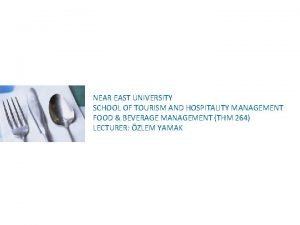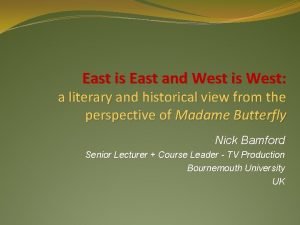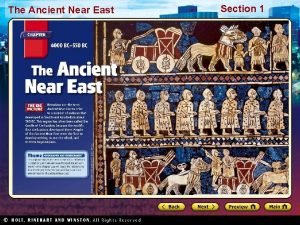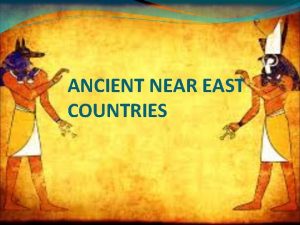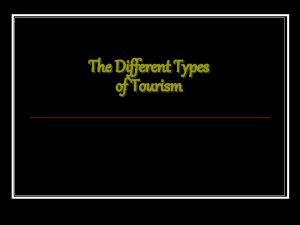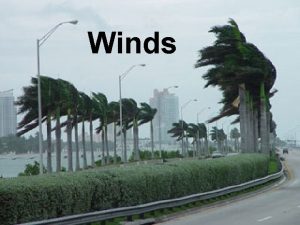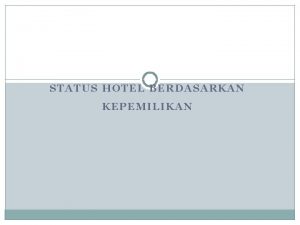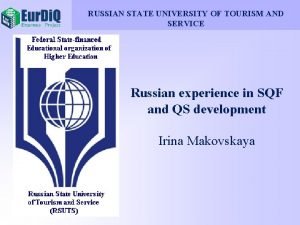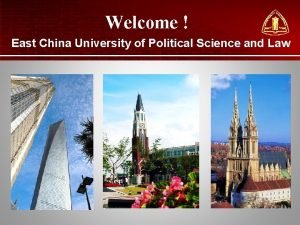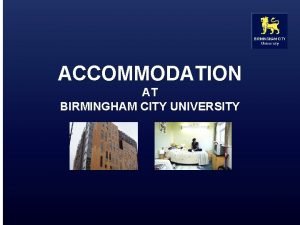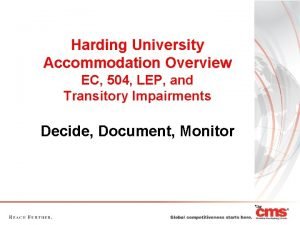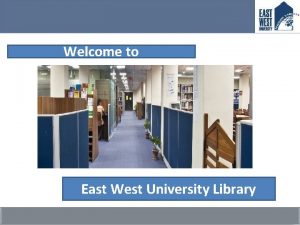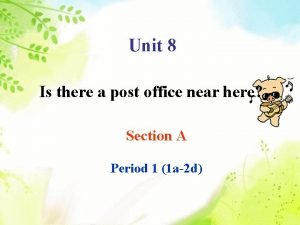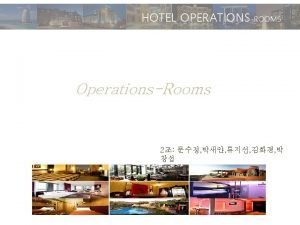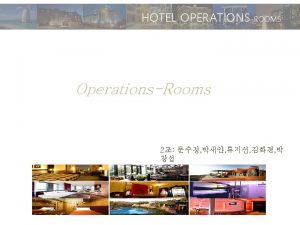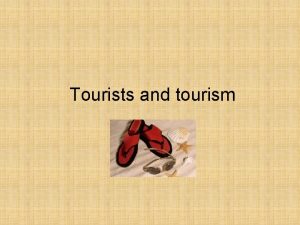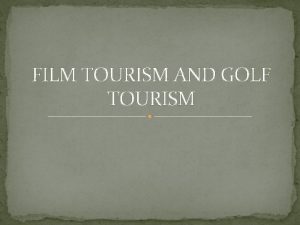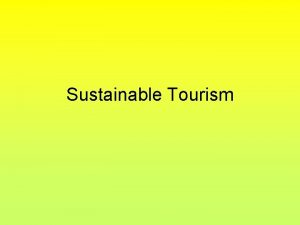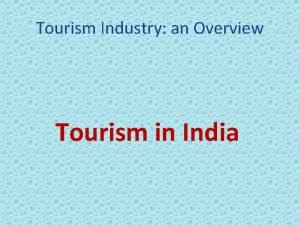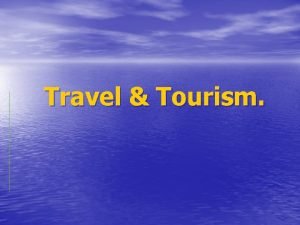NEAR EAST UNIVERSITY SCHOOL OF TOURISM AND HOTEL






















- Slides: 22

NEAR EAST UNIVERSITY SCHOOL OF TOURISM AND HOTEL MANAGEMENT SUBMITTED BY YAĞMUR ERBOLAY SUBMITTED TO ÖZLEM YAMAK THM 319 SPECIAL INTEREST TOURISM

Ecotourism and Conservation: Two Cases from Brazil and Peru

�This article evaluates two theories to explain the relationship between ecotourism and conservation. Two ecotourism projects from Brazil and Peru are compared. The Brazil illustrates sea turtle tourism that generates economic benefits for a local community.

�The Brazil study illustrates sea turtle ecotourism that generates economic benefits for coastal communities. �The case in Peru also generates economic benefits for a local community, but has the added goal of building local management capacity. In Peru, local participation in ecotourism management has also sparkled collective action for conservation.

Literature Review �We define ecotourism as nature tourism that intentionally seeks to deliver net positive contributions to environment conservation and sustainable development for local communities.

�Success and failure in ecotourism have varied over time as well. Short-term economic gains in some places have led to degradation of resources in longterm. �Some researches have measured conservation as an ethic, discernible through people’s attidudes or values. Others have evaluated conservations as a set of behaviours, either observed or reported, including how much people hunt or harvest timber, or how they dispose of waste.

�Tourism revenues can become incentives for local residents to conserve the natural resources tourists pay to see.

Economic Benefits and Conservation �Studies characterize ecotourism as a market-based approach to conservation. �The assumption is that “economic interests metivate the use of natural resources offering alternative income sources will alleviate the egregious behaviors of local residents.

�The logic further holds that more resource conservation, and conversely, that the cessation of benefits will signal demise for resources. �Income and employement opportunities often appear in studies as indicators of successful ecotourism projects, for exapmle how ecotourism income cause people to reduce their reliance on commercial agriculture, hunting and gol mining.

�In Costa Rica ecotourism became a primary source of income for families, a destination where visitors pay to see sea turtles. Economic benefits became incentives for residents to protect sea turtles.

�Women became responsible nor only for family chores, but also for producing handicraft items to sell to tourists. �Gentry show that Belizean women involves in the tourism industry experienced espacially high levels of stress and illness problems arishing from double workdays.

�Sea turtles are protected, local residents are not restricted from harvesting sea turtle eggs. However, because local economic benefits from harvesting are superior to those generated by ecotourism, changes in access and use of sea turtle eggs will likely generate resentment rather than increase local support for conservation.

Social Changes and Conservation �Social dimensionsof ecotourism affects natural resource use and conservation in host destinations. Whether and how local residents participate in ecotourism managament is one social dimension that affects resource use.

�An alternative framework looks beyond economic benefits and pays explicit attention to social , political and historical variables linking ecotourism and conservation. �In order to prevent loss of resources residents of a communuty may coorporate to create and monitor ecotourism reserve, or limit hunting ndd other forms of resource exploitation near a community ecotourism lodge.

Ecotourism suggest at least two causal relationships between ecotourism and conservation. The mechanism linking ecotourism with conservation is the creation of economic incentives.

Sea Turtles and Ecotourism in Brazil �The Brazilian sea Turtle Conservation Program, TAMAR promotes ecotourism as one strategy for protecting sea turtles. The center of Brazil collets enterance fees and features a retail store that sells sea turtle souvenirs.

�Overall, we found a positive relationship between TAMAR and the community. When TAMAR started in 1982, only 500 people were living in Praia do Forte and tourism activities were minimal. Respondents described a kind of “growing together” between the Project and the community, as fishermen and scientist changed information, and especially as the project provided certain kinds of support to the community.

�In summary, the Projeto TAMAR in Praia do Forte is an example of positive feed-backs between economic returns from ecotourism and conservation for marine life. TAMAR researchers have addressed 99% of the original threats on sea turtle eggs and nesting females in the region. This success is primarily a function of economic benefits associated with ecotourism at the Research Station and Visitor Center.

Rainforests and Ecotourism in Peru �Brazil represents a kind of ecotourism that promotes primarily employement and income benefits for local communities. � Attractions are tropical bird and mammal species, including abundant populations of large macaws, primates, giant otters, and caiman.

�the relationship between economic benefits from ecotourism and conservation is ambiguous in Infierno. Employment and income seem to have countervailing effects on resource use one minimizes direct reliance, whereas the other enables greater exploitation. What is clear from Infierno is that economic benefits from ecotourism are no panacea, either for community development or for long-term conservation goals.

Conclusion �In this article, we have compared ecotourism case studies with the intention of evaluating linkages between social changes, economic benefits, and conservation. In Brazil, employment opportunities and income from ecotourism have enabled sea turtle conservation, even though local villagers have not been engaged in management or decision-making. This case suggests that, at least in the short-term, economic benefits can effectively lead to conservation. The Peru case shows that engaging local residents as co-managers and decision-makers can provide economic incentives for conservation while also building local capacity to manage environmental problems.

�This case suggest that ecotourism can do more than deliver employment and income. Together the two cases reveal that ecotourism is not merely an economic “tool” for conservation so much as a cause of new understandings, skills, and social relations. They also occur as the result of new feeling capacity, the strength of local institutions and ties with outside actors, and overall social and economic stability.
 Classical brigade system
Classical brigade system Laissez faire theory
Laissez faire theory Near hip near shoulder tackling
Near hip near shoulder tackling East is east and west is west
East is east and west is west Early empires in the ancient near east
Early empires in the ancient near east The ancient near east
The ancient near east Ancient near east countries
Ancient near east countries Physical education during primitive era
Physical education during primitive era Mass tourism vs alternative tourism
Mass tourism vs alternative tourism Winds that blow over short distances are called
Winds that blow over short distances are called East river from the shelton hotel
East river from the shelton hotel Contoh independent hotel
Contoh independent hotel Hotel.hotelno=room.hotelno(hotel room)
Hotel.hotelno=room.hotelno(hotel room) Hyper-themed hotel: fantasyland hotel, canada
Hyper-themed hotel: fantasyland hotel, canada Russian state university of tourism and service
Russian state university of tourism and service East china university of political science and law
East china university of political science and law Birmingham city university student accommodation
Birmingham city university student accommodation Accommodation near harding university
Accommodation near harding university Hotels near avila university
Hotels near avila university Ewu library
Ewu library Where is the post office it is there
Where is the post office it is there Gosforth east middle school
Gosforth east middle school Viking doc band
Viking doc band
